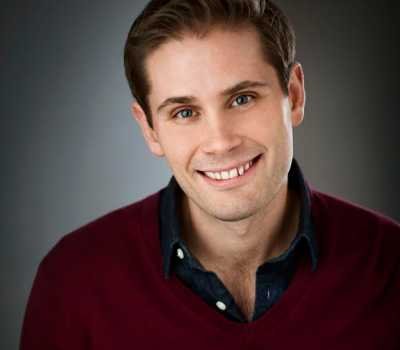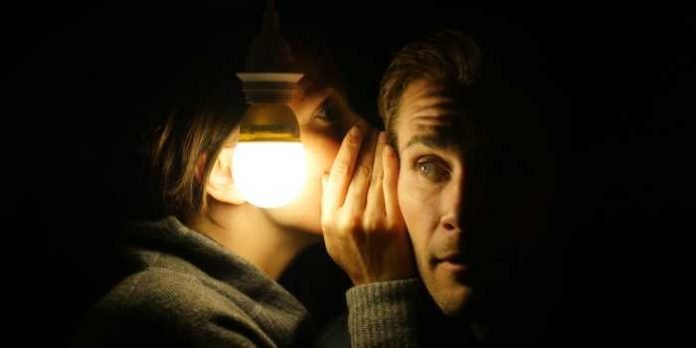Three Stories Up is no ordinary murder mystery. Borrowing a page from Vancouver’s Dark Table Restaurant, Alley Theatre presents playwright Mack Gordon’s latest work in a pitch-black theatre.
Relying on only voice, sounds, smells, and maybe even the odd tactile experience, audiences will need to paint the scene visually in their minds, as the story of a transit cop, looking to solve the mystery of her husband’s murder, unfolds.
In this Q&A we find out more about Three Stories Up from the playwright.
Q: Did you go into writing Three Stories Up with the concept of doing it in the dark in mind?
I didn’t! That was director, Marisa Emma Smith’s idea. The script takes place in a two-fisted Vancouver – a seedy, noir version of our beautiful town. Similar to my show from last year’s Fringe, Shake the Sheets!, the world is built through language. Unlike Shake the Sheets! it draws no attention to its form. I sent it out to a ton of ADs in town and heard nothing back for a full year. I’m not the best at pushy follow-ups so I started working on my next script, knowing that Three Stories Up was the one that I’d keep sending out to companies rather than produce myself.
Finally about five months ago, Marisa called me up and said she liked the script. She and Daniel, her producing partner at Alley Theatre, took a stack of scripts with them on a weekend at a cabin to figure out what Alley’s next project would be. They really liked Three Stories Up and wanted to put it on.
At the very first meeting Marisa gave me two options: the first was to do the show in the traditional way; we’d have to wait a year and a half in order to secure funding, find designers, rent a proper venue with a grid, etc etc etc. The second? A crazy idea: what if we did the show in the dark? The language and story lent itself to an aural landscape and wouldn’t it be fun to throw in Foley, smells, proximal experimentation, volume modulation, and, basically, anything else we could think of. Man, you know me, that is right up my aisle. So, five months and six script drafts later, here we are, ready to bust this experimental, dangerous show out on the public at large.
…five months and six script drafts later, here we are, ready to bust this experimental, dangerous show out on the public at large.
Q: What was it about this particular story that fit the vision for doing it in this manner?
The human voice. There’s lots to love about it, it’s fun, it’s a whodunnit, there’s action, lots of suspense, snappy dialogue, all that good stuff. But above everything else it’s about this woman: a transit cop – her life is very routine, she works the skytrain, the seabus, writes tickets for teenagers who don’t have bus passes – and she’s lost her husband. He’s been killed and she comes home from work one day and finds his body. And she’s grieving, man, but she doesn’t know how. Who knows how to grieve? How to move on? Send me an email if you do. So she decides she wants revenge. She wants to find his killer and she wants to make him bleed. But she doesn’t really know where to start. She’s not a detective, she’s not a vigilante, she’s just a regular Vancouverite, 72 hours ago her biggest concern was finding a high quality red pepper at some crappy local farmer’s market, but she finds herself on this quest, to fill this gaping void in her heart. And when she talks, when we hear her voice in the dark, trying to make sense of the world, it cuts right through me, straight through, and makes me think of the losses I know myself. Being able to picture it all in my imagination, to paint a landscape of cement – whether it be in an old biker bar, or the back office of a Catholic Church that looks more like a construction office – lets me forget about sets, lights, costumes, and remember that above all else stories are about humans and this crazy thing that being alive is; a mission that artists undergo to put something down on paper that can make someone else, another living person, feel a little less alone in the world. To just hear the characters’ voices, and that’s it, hones you in on what it is to be alive.
Q: Did writing for this concept create unique problems for you as a writer?

There’s an old adage – that I subscribe to – that the best writing ‘shows’ instead of ‘tells’. How do you show something when no one can see it? The first instinct is to take the play into a literary world – someone smart once told me that books are what people think, movies are what people see, and plays are what people say – so to be literary but also interesting in the context of a stage show requires some seriously deft dialogue. It’s required an incredible diligence to come up with solutions to not being able to visually show anything, yet clearly communicate the story, while avoiding being boring in my construction of setting, narrative, and character. “The reporter had grey hair, glasses, and a big jaw” is kind of boring to me. Instead I smash my head against the wall until “black glasses, a hedgehog of salt and pepper hair, the face of a character drawing you’d buy on the boardwalk of a beach,” comes out. It’s conjuring as much as it is writing. So yeah. It’s been a challenge.
Q: The play was cast in a blind audition as well, was that the intent going in from the start?
Yes. Theatre requires an attention to the climate and community of where you work more than any other art form. Every time you produce, you are, literally, face to face with the political, cultural, and socioeconomic realities of your audience. We had a really unique opportunity with this show to put any kind of visual representation completely out of our minds. We sent out a call for anyone who was interested to apply. You could identify as a male and audition for the female role we were casting, it didn’t matter your age, you didn’t have to look any kind of way, or be any kind of person. You just had to come down to Playwright’s Theatre Centre where we were holding auditions and put on your best little mini show. All we could do was cast the person we felt was the best for the role based on hearing them speak the lines. We had a lot of really great options. One person even brought in their own Foley kit. It ended up being a lot of fun.
Q: What was the audition process like? Did actors have any difficulty with the idea of doing this in the dark?
Some people messed with us. Some people didn’t speak at all outside of the actual audition sides. We had a lot of good feedback about the process, it was interesting and, in a lot of ways, put the power into the actors’ hands. I can’t tell you how rare that is.
Q: You are incorporating more than just sound into the production – can you tell us more about how the other senses will be involved?
Of course not! We’re all about surprises and mysteries with this show. You’ll have to come down to our spot at 805 E. Pender to find out. Initially we’d announced a secret location for the show but the logistics of that became waaaaay too heavy. We scrapped it because we have enough other mysteries to bare the weight. Also, we’re experimental theatre and we can do whatever we want, that’s what makes us so exciting.
Q: The advance press talks about giving the audiences the opportunity to experience “being blind” for the duration of the show – why is that important?
I don’t know if “being blind” is the right way for us to talk about the experience. It feels more than a little entitled to think that sitting in a theatre for an hour or so can replicate that. Certainly, being deprived of sight for an extended period of time heightens your other senses. That’s the opportunity we’re looking for. Also, it’s not just that you can’t see, no one can see you. Slouch away, put your hands over your face, close your eyes, move to the music, have a little nap, I don’t care. We went to the Dark Table as an exercise in what being visually deprived is like, for me, it really amped up my feeling of community with the people I was with. I felt like I could be completely myself, I was a better listener, and it fostered a giddiness in me. I don’t know why. We want to give people the full experience of that and we’re working hard to make sure that everything surrounding the show – being led into the theatre, buying a drink or snacks, the preshow – supports that.
Q: Will audiences be surprised when the lights come up?
I hope so. More so, I hope they leave the theatre feeling a strange kinship with the people they were sitting amongst. Sometimes the most fun a murder mystery can provide is after it’s done: when you stand next to a stranger at the sink in the bathroom and start to unravel all the twists and turns of the dark, dusty road you just went down together. That’s what theatre is to me, and I think Three Stories Up is going to give audience members enough to talk about to last them years.
Three Stories Up plays at 805 East Pender St in Vancouver from October 20 to 31. Visit https://alleytheatre.ca for tickets an information.

